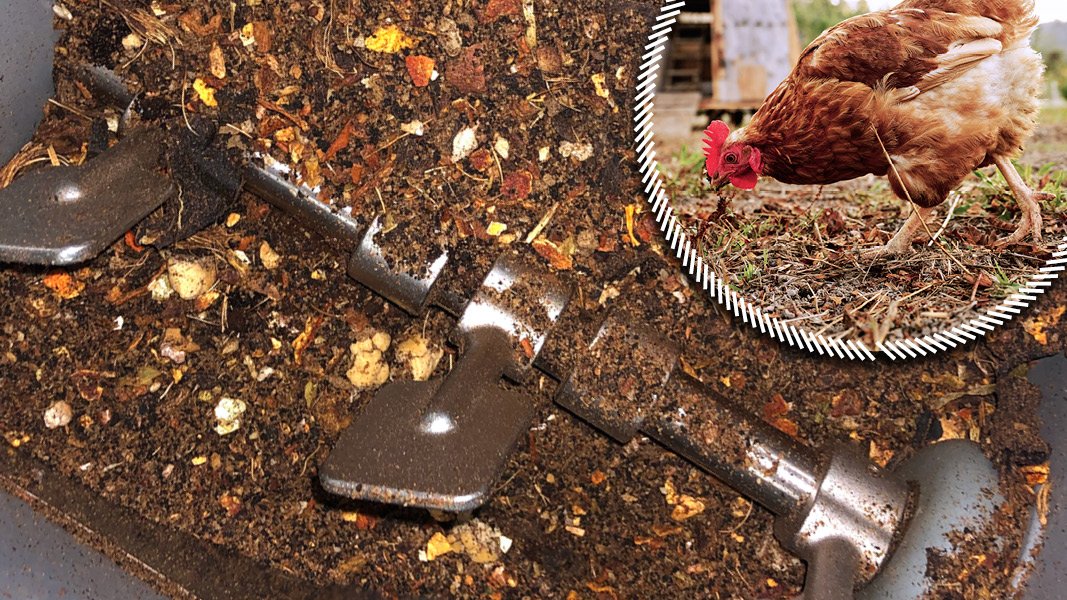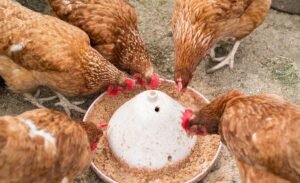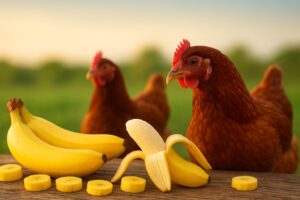Wondering if tossing kitchen scraps to your chickens could land you in legal trouble? Here’s what you need to know.
TL;DR: It’s not illegal federally, but in many U.S. states, feeding chickens meat, dairy, or spoiled scraps can lead to fines—especially for commercial flocks.
When I first got my backyard flock, I pictured them happily gobbling up kitchen leftovers. It felt sustainable. Then, a fellow chicken keeper mentioned, “You know that’s illegal in some places, right?” My jaw dropped. Illegal? To feed chickens scraps? It turns out… it’s complicated.
Why is it Illegal to Feed Chickens kitchen Scraps?
The truth? It varies. Legality depends entirely on your location. No huge federal ban exists for most kitchen scraps for backyard chickens. But many states—and local towns—have strict rules, especially for animal products.
Federal vs. State Laws on Feeding Scraps
Federal agencies (USDA, FDA) focus on big commercial farms. Their goal? Stop widespread disease.
For backyard flocks, rules fall to individual states, counties, or cities. What’s fine in Oregon might land you a fine in California. Regulations are a patchwork; knowing your local rules is crucial.
Want to dive deeper into chicken laws across the U.S.? Check out our full guide on Chicken Laws by State.
What the USDA and FDA Say About Chicken Feed
The USDA (U.S. Department of Agriculture) and FDA (Food and Drug Administration) worry about stopping animal diseases. Especially those that jump to humans (zoonotic diseases) or devastate farm industries.
Their main focus: “Prohibited materials” in animal feed. Think “ruminant-derived protein”—stuff from cows, sheep, or goats. This prevents diseases like Bovine Spongiform Encephalopathy, or “Mad Cow Disease.” You can find more details on the FDA’s prohibited materials regulations here.
Federal rules target big feed makers and large livestock farms. Their ideas often trickle down, influencing state rules for all poultry. They strongly discourage feeding any meat or animal by-products. It’s all about stopping disease.

Why Are Kitchen Scraps Restricted for Chickens?
Kitchen scraps are restricted mainly to prevent disease transmission to chickens and humans, especially from animal products and spoiled food.
These rules aren’t just red tape. They come from serious concerns about public health and poultry health.
Disease Prevention and Biosecurity Risks
The biggest reason to limit kitchen scraps is disease prevention. Imagine feeding chickens leftover chicken or pork. What if that meat held a nasty germ—like avian influenza, salmonella, or botulism? Your chickens could get sick.
Those birds could then spread it to other flocks—or even your family through eggs or meat. Yikes.
This is where biosecurity comes in. It’s about keeping diseases out of your flock. Feeding “prohibited materials” is a major biosecurity risk. The USDA provides resources on biosecurity for backyard flocks here.
A past Exotic Newcastle Disease outbreak in California linked to illegal feeding of uncooked meat scraps to poultry. This isn’t just theory; there are real consequences.
Cross-contamination from Animal Products
The concern isn’t just the meat itself. It’s also cross-contamination. Even if you’re careful, using a cutting board for meat then for vegetable scraps without cleaning can transfer germs.
Animal fats and oils are also a problem. They spoil fast and can hold harmful bacteria.
Concerns About Food Safety and Public Health
Ultimately, these rules protect the food supply and public health. If backyard chickens eat unsafe scraps, and their eggs or meat are eaten, human health is at risk.
Governments want to block any path for diseases to enter the food system—from your backyard to your dinner plate.
What Happens If You Break the Rules?
Breaking the rules on feeding chickens kitchen scraps can lead to warnings, fines, or even more severe penalties depending on your location and the severity of the violation. Consequences vary a lot.
Legal Penalties and Fines by State
Penalties depend heavily on your state and local rules. Some states might give a warning first. Others could fine you hundreds or thousands of dollars, especially if there’s a health risk or repeated violations.
In severe cases—for commercial farms—it could mean flock quarantine or even culling.
Who the Rules Apply To (Backyard vs. Commercial Keepers)
Commercial poultry producers face much stricter rules and harsher penalties. They’re part of a highly regulated food chain.
But backyard chicken keepers are not exempt. While enforcement might be less frequent, rules still apply. It’s a common mistake to think “small-scale” means “unregulated.” I learned that the hard way.
State Examples: California, Georgia, and Texas
- California: They ban feeding “garbage” to swine and poultry. “Garbage” includes all meat, meat products, and any food waste. Violations can lead to fines. See California Code of Regulations, Title 3, Section 1190 for details. You can often find specific regulations through the California Department of Food and Agriculture.
- Georgia: The Georgia Department of Agriculture has clear rules. They discourage feeding meat or meat products and warn against anything that could spread disease. Georgia Rules and Regulations, Chapter 40-13-1, outlines feed requirements. Check the Georgia Department of Agriculture website for details.
- Texas: Similar to other states, Texas stresses biosecurity. They discourage feeding any animal products or “swill” to poultry to prevent disease. The Texas Animal Health Commission provides relevant information.
My advice? Always check your state’s Department of Agriculture or local extension office. That’s where you’ll find the most current rules for your area.
Which Kitchen Scraps Are Considered Unsafe or Illegal?
To be absolutely safe, avoid feeding your chickens anything that could pose a risk.
Animal-Based Scraps (Meat, Dairy, etc.)
This is the big one, the absolute no-go. Any meat, poultry, fish, eggs, or dairy products (milk, cheese, yogurt) are generally unsafe—or even illegal—to feed chickens. This includes:
- Cooked or uncooked meat scraps
- Bones, skin, fat, or gristle
- Leftover pizza (because of cheese and meat)
- Greasy foods
- Dairy products like milk, cheese, or yogurt
These items are just high-risk. High-risk for disease, high-risk for spoilage.
Moldy or Spoiled Foods
“Can chickens eat moldy food?” Absolutely not! This is a hard stop. Mold can produce mycotoxins, incredibly toxic to chickens. They can cause serious illness, or worse.
Always discard moldy or spoiled food in the trash. Never in the chicken run. This also applies to rotten or fermented foods.
Coffee Grounds, Chocolate, and Other Toxic Foods
Beyond animal products and mold, other common kitchen items are simply toxic to chickens:
- Coffee grounds: Contain caffeine, which is toxic.
- Chocolate: Has theobromine, also toxic.
- Avocado pits and skins: Contain persin, which can be harmful.
- Rhubarb leaves: Have oxalic acid.
- Green potato skins or green parts of tomatoes: Contain solanine.
- Salty foods: Too much salt is bad for chickens.
- Onions and garlic: Can cause hemolytic anemia.
🚫 When in doubt? Throw it out. It’s not worth the risk to your flock.
What Scraps Can Chickens Eat Safely?
Chickens can safely eat most fresh fruit and vegetable trimmings, plain cooked grains, and stale (not moldy) bread in moderation.
While the “don’ts” list might seem long, don’t despair! Plenty of safe and healthy kitchen scraps your chickens can enjoy.
Safe Fruit and Vegetable Trimmings
These are generally your best bet for safe kitchen scraps:
- Vegetable peels and ends: Carrot peels, cucumber ends, lettuce leaves, broccoli stems, or corn on the cob (after you’ve eaten the kernels, of course!).
- Fruit scraps: Apple cores (no seeds), berry tops, melon rinds, or even banana peels (in moderation).
- Cooked vegetables: Plain cooked peas, corn, green beans, or squash are fine.
Just always make sure they’re fresh, clean, and free of mold or pesticides.
Whole Grains and Cooked Rice
Chickens love grains!
- Stale (but not moldy) bread: Give it as a treat, in moderation.
- Cooked pasta: Plain, unsauced.
- Cooked rice: Plain.
- Oatmeal: Cooked or raw.
These can be a fun addition to their diet, but remember: they should never replace their balanced commercial feed.
Homemade Chicken Treat Mixes
You can even get creative and make healthy treat mixes using safe scraps. Think of it like a “chicken salad”—chopped cooked vegetables, a little cooked rice, and some scratch grains. This way, you control all ingredients and ensure everything is safe.
Expert tip: Keep portions small. Scraps should be a treat—no more than 10% of their total diet. Their main food source must always be a high-quality, complete commercial chicken feed. An imbalanced diet can lead to health problems and reduced egg production.
For a comprehensive guide on what your flock can and can’t eat, check out our article: What Can Chickens Eat From Your Kitchen?
Safe vs. Unsafe Scraps: A Quick Guide
| Food Item | Safe for Chickens? | Notes |
|---|---|---|
| Cooked Rice | ✅ Yes | In moderation |
| Meat Scraps | ❌ No | High disease risk, often illegal |
| Moldy Veggies | ❌ No | Contains mycotoxins |
| Fruit Peels | ✅ Yes | Avoid seeds (e.g., apple) |
| Pizza | ❌ No | Meat, cheese, grease, processed food |
| Coffee Grounds | ❌ No | Toxic (caffeine) |
| Dairy Products | ❌ No | High disease risk, often illegal |
| Fresh Veggies | ✅ Yes | In moderation, no mold |
| Cooked Pasta | ✅ Yes | Plain, unsauced, in moderation |
What About the Amish and Traditional Farmers?
It’s true, many traditional farming communities—including some Amish—have historically fed kitchen scraps to their livestock, chickens included. This practice often predates modern biosecurity rules. It was born from necessity, and a strong desire to minimize waste.
Do the Amish Feed Scraps to Chickens?
While specific practices vary by community and family, many Amish farmers do feed their chickens a wider variety of scraps. Sometimes, these include things considered illegal or unsafe under modern rules. Their operations are often isolated, and their practices are deeply rooted in tradition.
Legal Grey Areas in Rural Practices
This creates a fascinating “legal grey area.” While laws technically apply to everyone, enforcement can differ significantly. Think about it: a huge commercial farm versus a small, traditional homestead.
Regulatory bodies often prioritize enforcement where disease risk is highest. But remember, cultural practices don’t exempt anyone from the law. Modern backyard keepers, especially in more populated areas, are often under closer scrutiny than their traditional counterparts.
What’s the Rule on Feeding Chickens Mealworms or Pizza?
These are two common “treat” questions that pop up.
Why Mealworms Are Banned in Some States
“Why are mealworms banned in some states?” This might sound odd, right? Mealworms are a natural protein source for chickens! The issue isn’t the mealworm itself, but often its origin.
Some states ban feeding mealworms (or other insect proteins) if they’re imported from certain countries, or if their production isn’t regulated. This prevents introducing foreign diseases or germs. So, always check your state’s rules on insect protein sources. It’s usually about where the mealworm came from, not the mealworm itself.
Pizza, Grease, and Processed Foods: Yes or No?
“Can chickens eat pizza?” A resounding no! Seriously. While a chicken might happily peck at a discarded slice, pizza is a triple threat:
- Meat/Dairy: It’s got cheese, and often meat, both banned.
- Grease/Oils: High in unhealthy fats; can cause digestive upset.
- Processed ingredients: Often contains too much salt, artificial flavors, and other things not good for chickens.
The same goes for most highly processed foods—chips, sugary snacks, or heavily sauced leftovers. They offer little nutrition and can be harmful. They’ll eat it, sure, but should they? Probably not.
How to Feed Chickens Legally and Safely
Staying on the right side of the law and keeping your flock healthy doesn’t have to be hard.
Store-Bought Feed vs. Homemade Rations
For most backyard chicken keepers, the safest, easiest approach is to use store-bought, nutritionally complete commercial chicken feed. These feeds give your birds all the vitamins, minerals, and protein they need for health and egg production.
If you add scraps, stick to that “safe” list (fruits, vegetables, grains). Make sure they are a very, very small portion of their overall diet. Homemade rations are complex to get right, and honestly, not for beginners.
Compost First, Then Feed? (Hot Composting Strategy)
Here’s a clever strategy to minimize waste and benefit your flock: hot composting. Instead of feeding animal-based scraps directly to your chickens, compost them first. A well-managed hot compost pile gets really, really hot—temperatures that kill germs.
Once the compost breaks down and cools, let your chickens scratch through it. They won’t eat the original meat scraps, but rather the worms, insects, and good microbes in the compost. This lets them forage naturally and benefit from the compost, without direct risk from prohibited materials. I actually started doing this after a friendly warning from a local agricultural extension agent – it was a game-changer for my waste reduction efforts!
Tips to Stay Compliant with State Guidelines
- Know your local laws: This is the most important step. Check your state’s Department of Agriculture website, or call your local extension office.
- When in doubt, throw it out: If unsure about a food item, don’t risk it. Seriously.
- Educate yourself: Understand why certain foods are banned—it’s usually about disease risk or toxins.
- Keep it clean: Always maintain good biosecurity practices in your coop and run. For more on keeping your coop safe, explore our guides on Predator-Proofing 101: Easy Fixes for a Safer Coop and What Is The Best Predator Deterrent For Chickens?. Proper coop setup also includes good ventilation to prevent issues; learn about 17 Coop Ventilation Mistakes That Overheat Your Flock.
Frequently Asked Questions (FAQs)
Is it illegal to feed chickens kitchen scraps everywhere in the U.S.?
No, not everywhere. Legality varies by state and local municipality. Always check local rules.
Why are meat and dairy scraps prohibited for chickens?
Meat and dairy can carry pathogens (like avian influenza or salmonella), risking both chickens and humans.
Can backyard chicken owners be fined for feeding illegal scraps?
Yes, owners can face fines. Enforcement varies by location and is stricter for commercial farms.
What are some safe kitchen scraps for chickens?
Safe scraps include fresh fruit and vegetable trimmings (e.g., carrot peels, cucumber ends), plain cooked grains, and stale (not moldy) bread, all in moderation.
Is it safe for chickens to eat moldy food?
No, never feed moldy or spoiled food. Mold produces mycotoxins, highly toxic to chickens, causing serious illness.
Key Takeaways: How to Stay on the Right Side of the Law
Navigating rules for feeding chickens kitchen scraps can feel complex. But a few core principles keep you compliant and your flock healthy.
Quick Checklist for Safe Chicken Feeding
- NO meat, poultry, fish, or eggs (cooked or raw).
- NO dairy products.
- NO moldy or spoiled foods.
- NO coffee grounds, chocolate, avocado pits/skins, rhubarb leaves, green potatoes/tomatoes, onions, garlic, or overly salty/sugary processed foods.
- YES to fresh, clean fruit and vegetable trimmings (in moderation).
- YES to plain, cooked grains and stale (not moldy) bread (in moderation).
- YES to a high-quality commercial feed as their primary diet.
- Consider hot composting animal-based scraps for insect foraging, not direct feeding.
Resources to Check Local Regulations
To be absolutely certain about your area’s specific rules, always consult:
- Your State’s Department of Agriculture website (e.g., USDA.gov links to state resources).
- Your County Extension Office.
- Local city or county ordinances (often found on municipal government websites).
Further Reading for Your Flock
Ready to become a chicken-keeping pro? Dive into these helpful resources:
- Getting Started:
- Coop & Run Essentials:

Oladepo Babatunde is the founder of ChickenStarter.com. He is a backyard chicken keeper and educator who specializes in helping beginners raise healthy flocks, particularly in warm climates. His expertise comes from years of hands-on experience building coops, treating common chicken ailments, and solving flock management issues. His own happy hens are a testament to his methods, laying 25-30 eggs weekly.



